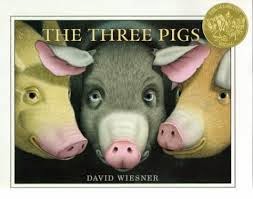Recently, as I was trying to stay out of the brutal Chicago cold, I popped into Barnes & Noble to warm up with hot chocolate and a stack of children's books. Entering the kids' section, I was greeted by this sign:
And below the sign, this collection of books:
So what "new kind" of stories are these? They are all works that employ the literary device of metafiction. Metafiction is defined as "fiction that deals, often playfully and self-referentially, with the writing of fiction or its conventions." Or, as Philip Nel, professor of English at Kansas State University explains, metafiction is "fiction about fiction. A book that reflects on what a book is or could be; it self-consciously plays with the form of the book." (Although B&N's displayed titles are newer ones, metafiction is not new -- note some of the publication dates below.)
Have you ever heard of "breaking the fourth wall"? This phrase is what sent me on a search that uncovered the world of metafiction for me. The term derives from the theater, where a stage has a back wall, two side walls, and a transparent fourth "wall" that marks the separation of actors from their audience. The fourth wall is broken when an actor (or a writer) speaks to or engages the audience.
The Monster at the End of this Book (1971), by Jon Stone and Mike Smollin, a favorite from my childhood, was probably my first encounter with metafiction. The book breaks the fourth wall as Grover pleads with the reader to not turn the page.
Chloe and the Lion (2012), by Mac Barnett and Adam Rex is a brilliant example of breaking the fourth wall. In fact, Adam Rex sets the action on a stage, which heightens the effect. In this story, the author and illustrator wreak havoc in the story when they are not happy with each other's work.
Another metafictive device is writing a story in which the main character writes his/her own story. Harold and the Purple Crayon (1955), by Crockett Johnson, is an example, where Harold determines his own storyline with his purple crayon.
Aaron Becker's books Journey (2013) and Quest (2014) utilize this same type of device.
In David Wiesner's The Three Pigs (2001) the characters show an awareness that they are in a story (or blown out of it), which is metafictive.
In some metafictional books, readers of the story force the author to "change" the story. B. J. Novak's hit, The Book With No Pictures (2014), doesn't so much change a story as force the person reading it aloud to say all kinds of crazy things. Watching young children react to this book is a sheer delight!
Spot the Plot: A Riddle Book of Book Riddles (2009), by J. Patrick Lewis and Lynn Munsinger, is an example of a book that references other books through clever riddle poems.
Perhaps my favorite new metafictional release is This book just ate my dog! (2014) by Richard Byrne. Using the physical conventions of the book, characters in the story keep disappearing into the gutter at the center. It takes a hefty shake by the reader to release them.
Why is metafiction so popular? Perhaps it is physical interaction added to the mental interaction that the reader experiences. Perhaps it is the capacity for quirky humor, as many metafictional books are funny ones. Philip Nel says that "the best metafictional works can encourage readers to reflect upon what they're reading or watching, allowing them to step outside of some of the conceptual boxes that enclose them...[They] invite readers to question rather than accept received realities." I love Mac Barnett's reflection that he works very hard to break the fourth wall in the opposite direction -- he doesn't want the reader to enter into the book, he wants his fiction to leak out into the world.
Check out some of the other books from the B&N display above and search for others on your library shelves. Then tell me, what are your favorite metafictional books, readers?
To hear Philip Nel talk about metafiction, click here.
To hear Mac Barnett's TED talk, click here.









